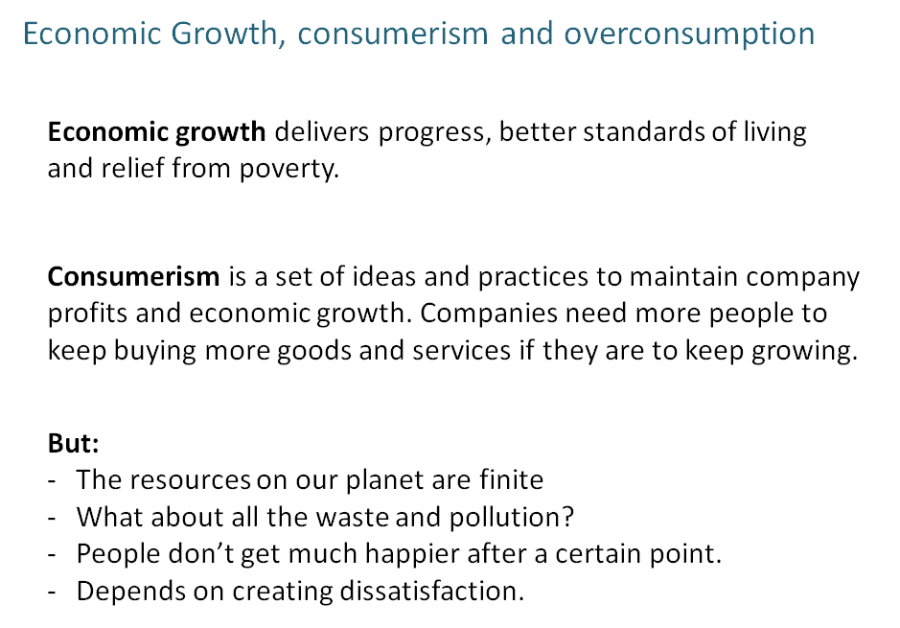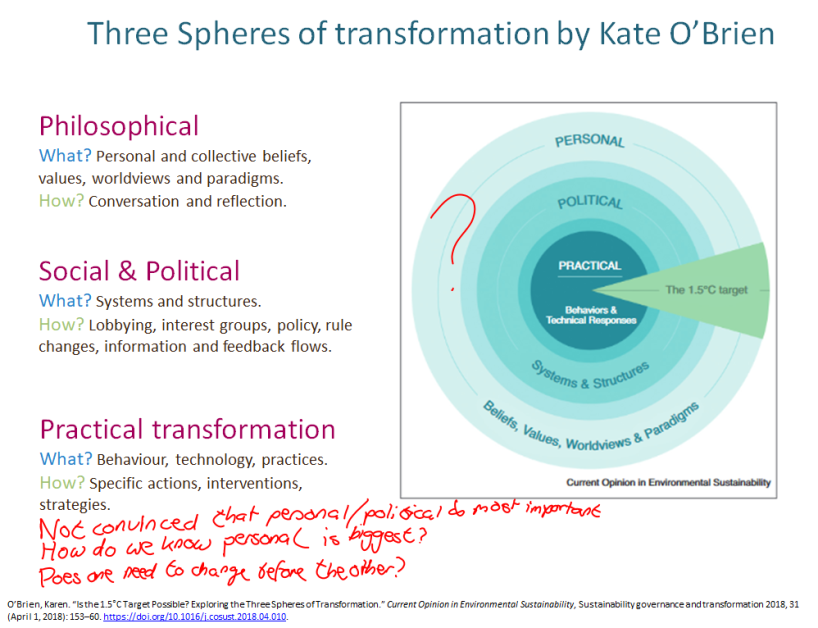This page was created for the participants in one of our Climate Conversations. It records our thoughts and feelings on the topic that day. Responses are edited for clarity and anonymity. They aren’t fact-checked so there may be errors and inaccuracies.
In the last couple of meetings, we talked about consumerism and economic growth and their role in the climate crisis. The natural next question is what can we do about it? How do you start tackling an idea deeply embedded in our society and culture?
Before our conversation began, there was a recap of what economic growth and consumerism mean, and why these big ideas (called paradigms, mindsets or worldviews) matter.


The Three Spheres of Transformation
The Three Spheres of Transformation was developed by Kate O’Brien. She was exploring how we could understand and accomplish the deep and wide-ranging social changes needed to meet the 1.5oC target. She organises all the changes needed into three categories: the personal, the political and the practical. She says that in each of these areas, we need a transformation to happen – it’s already too late for small incremental changes.

We need a new model of progress
This idea comes from philosopher Kate Soper in her book about what a society based on alternative principles to growth could look like, and how we might get there.
We looked at one of her ideas from this book: that we need different ideas of what progress means, and new ways of defining prosperity and success.
Our thoughts were:
“We need an alternative to GCP. A different index of well-being”.
“Changing the model could make people happier”.
“It’s similar to self-help which can be really annoying. If you don’t get the promised results you feel like a failure”.
“Chasing happiness causes problems”.
“We’re still stuck in the same rules and mindsets. We’re so entrenched in it we can’t escape that way of thinking”.
“Being goal-oriented makes people feel rubbish if they don’t achieve it”.
“We need to abandon chasing success”.
“Although we do need a purpose. We need to have some goals and aims”.
“I wonder how cavemen or animals respond? Do they have a concept of success?”.
“In some concepts I want people to focus on being successful, surgeons for example”.
“What would a good model of progress look like?”.
“At the moment success at a national level means strength and competition. A better model might be cooperation. Perhaps it could be measured how long a country goes without getting into a conflict”.
“The current idea of progress has been used to justify a lot of evil”.
“We put a lot of faith in technological progress to get us out of the problems we know we’re causing”.
“What happens in tribal societies? Are there natural limits on their expansion? Or do their culture and social systems help them stay within limits?”
“Do they have a different model of progress in Scandinavia? They seem to do well on ranking in things like health and education”.
Challenge the assumption that today’s affluence is good for our wellbeing
This is another idea from Kate Soper. In her book she points out that although we assume that our current standard of living is good for us, it creates many problems. She suggests that one way of moving beyond growth is to challenge that assumption by pointing out the problems.
Our thoughts were:
“It’s already happening with apps like Vinted (second-hand clothing) becoming trendy”.
“The better-off are healthier, although above a certain level having more wealth isn’t helpful. But if you’re living below a certain level then getting more can be life-changing”.
“Our affluence comes at the expense of others”.
“It’s a self-centred and selfish way of thinking”.
“Are we talking about personal well-being or social, or planetary?”.
“Affluence also comes from inequality. You need someone to be worse off than you to feel good about yourself”.
“We did come up with a good, long list of problems in an earlier conversation”.
“At a certain level of wealth, you can pay people to solve your problems and this separates you from other people”.
“You see yourself as being normal or average, even if you have a lot of wealth. We compare ourselves to our peers”.
“We’re protected from seeing ourselves as privileged”.
“Would a higher wage change me?”.
“Are we comparing today’s affluence to the past?”.
“Each generation is supposed to do better than our parents. Though that’s coming apart”.
“Things are cheaper and mass-produced. The costs of that are hidden. The stuff that’s made is shit. It doesn’t last because of planned obsolescence”.
“Not everything is cheaper. Education, housing, childcare are more expensive”.
“The assumption is spread by influencers and advertising.
“Well-being is used by influencers to sell a lifestyle and products. They associate mindfulness and well-being etc. with wealth”.
“It seems everything is commodified and monetised”.

Sources
O’Brien, Karen. “Is the 1.5°C Target Possible? Exploring the Three Spheres of Transformation.” Current Opinion in Environmental Sustainability, Sustainability governance and transformation 2018, 31 (April 1, 2018): 153–60. https://doi.org/10.1016/j.cosust.2018.04.010.
Soper, Kate. Post-Growth Living: For an Alternative Hedonism. Paperback edition. London New York: Verso, 2023.